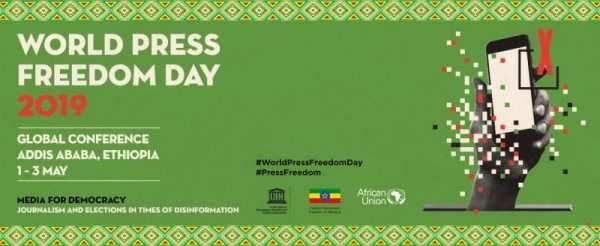Celebrating the people, technology, ideas & innovations that are literally transforming the way law firms & in-house legal teams operate. See event details here.
Cybersecurity and Data Privacy Law Conference 2019
Presented by the Institute for Law and Technology, this conference brings together cybersecurity professionals from the region and around the country to provide advice and guidance to in-house and private practice attorneys on cybersecurity legal issues.
You can click here for more information on the event.
Mapping the Impact of Digital Technology from Network Disruptions to Disinformation
By Rocio Campos |
Signed by African journalists during a United Nations Educational, Scientific and Cultural Organization (UNESCO) seminar in May 1991, the Declaration of Windhoek is a statement of free press principles that led to the proclamation of World Press Freedom Day (WPFD) on 3 May by the UN General Assembly in 1993. This year, the Global Network Initiative(GNI) is proud to join UNESCO, the African Union, and the Government of Ethiopia for the 26th celebration of WPFD in Addis Ababa under the theme, “Media for Democracy: Journalism and Elections in Times of Disinformation.”
On 3 May, GNI Policy Director Jason Pielemeier and representatives from GNI members the Committee to Protect Journalists (CPJ), Collaboration on International ICT Policy for East and Southern Africa (CIPESA), Facebook, and the International Media Support (IMS), together with the Ethiopian journalist Abel Wabella will participate in the session: “Understanding Electoral Information Flows: Mapping the Impact of Digital Technology from Network Disruptions to Disinformation.” This workshop will build on an earlier colloquium organized by GNI and UNESCO titled Improving the Communication and Information Ecosystem to Protect the Integrity of Elections.
In 2019, 62 countries will elect leaders who will govern 3.28 billion people worldwide. Hence, it is paramount to understand the impacts of digital technology on information flows during elections and bring to the table the perspectives of different stakeholders.
Are Transparency and Access to Information Enough to Secure Free Elections?
According to UNESCO “Internet and digital technologies allow candidates a direct means by which to communicate with the voting public. However, some digital technologies used to influence people’s choices escape scrutiny — such as whether, for example, advertising complies with the rules of electoral authorities. Without effective access to information and transparency, the integrity and legitimacy of elections can be compromised. We need technology companies and governments that are more transparent, and that respect the rules and regulations of elections, in order to guarantee free and fair elections.”
GNI information and communications technology (ICT) company members face increasing orders from governments to disrupt networks and restrict access to Internet services. Such orders often take place during protests or elections with significant consequences for users and journalists around the world. GNI members (ICT companies, human rights and press freedom organizations, academics, and investors) work to counteract these trends and protect freedom of expression and privacy rights in a variety of ways. For instance, on the issue of network interference, Netblocks’ Internet observatory has collected evidence of blocking of a political party website in Pakistan in the 2018 election and CIPESA released a report that documents the relation between network disruptions and elections in Africa. Others like the #KeepItOn coalition have developed infographics guiding users on how to install Virtual Private Networks (VPNs) anticipating Internet disruptions, as seen in the Nigerian election last February.
Elections have also become the focus of disinformation campaigns, making online platforms vulnerable targets for the dissemination of divisive and false narratives. Multistakeholder engagement can play a key role to confront this evolving assault on the Internet affecting democratic processes. In July 2017, Google and Jigsaw unveiled Protect Your Election with free tools to help voters get accurate information in the Kenyan election.[1] In the U.S., Pen America recently released a report, which analyzes efforts to counter fraudulent news in the 2018 midterm election, stressing the importance of social media platforms, candidates and political parties stepping up efforts to keep fraudulent news from polluting the 2020 election cycle. Research centers like the Center for Data Innovation are discussing the use of Artificial Intelligence (AI) to fight disinformation in European elections, while organizations like Freedom House have developed tools that estimate Internet censorship, i.e., Internet Freedom Election Monitor.
GNI‘s session will take advantage of the expertise of panelists and participants to map the different ways in which digital technology impacts election-relevant information flows, as well as the inter-relationships between these impacts. The goal is to help policymakers, companies, elections administrators, elections observers, media, and other stakeholders identify and mitigate risks, improve planning and coordination, and enhance transparency around their efforts to support elections. Active multistakeholder engagement can play a key role to strengthen transparency and access to information and prevent them from being compromised during elections.
Don’t miss GNI’s panel on 3 May at 14:00–15:30 EAT and follow IMS’ @andreasr | Addis Zeybe’s @Abelpoly | CIPESA’s @ChewingStones | CPJ’s @muthokimumo | Facebook’s @emigandhi | GNI’s @pielemeier #WorldPressFreedomDay
Relevant resources:
- 2019 WPFD’s provisional agenda
- UNESCO on freedom of expression
- GNI’s one-page guide: Weighing the Impact of Network Shutdowns and Service Restrictions
- GNI’s Principles on Freedom of Expression and Privacy
- Improving the Communication and Information Ecosystem to Protect the Integrity of Elections (Conclusions of GNI/UNESCO Colloquium, February 2017)
[1] See: Freeman, Bennett, Shared Space Under Pressure Business Support for Civil Freedoms and Human Rights Defenders, p.74
This article was originally posted here
AfriLabs Annual Gathering 2019
The AfriLabs Annual Gathering provides a unique opportunity for tech hubs in the AfriLabs network and other stakeholders in the African tech ecosystem. Click here for more information about the event.
Internet Governance Forum (IGF)
The Internet Governance Forum (IGF) is an open discussion platform for the United Nations. It deals with current legal, political, social and technical issues of the Internet.
Click here for more details on the event.

